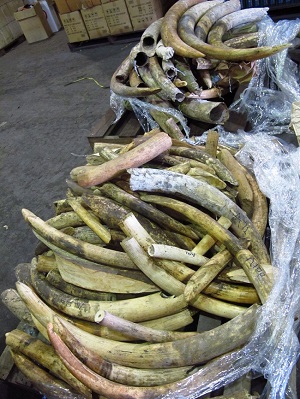
Asia’s economic growth driving illegal animal tusk trade to record highs
Bidhu Bhushan Palo | @TheDollarBiz
 White Rhinoceros (Ceratotherium simum) Female with very long horn and calf. Lake Nakuru National Park, Kenya (Copyright: Martin Harvey / WWF-Canon)
White Rhinoceros (Ceratotherium simum) Female with very long horn and calf. Lake Nakuru National Park, Kenya (Copyright: Martin Harvey / WWF-Canon)Economic growth in China and other Asian countries is fuelling illegal trade of animal products such as rhino horns and elephant tusks to dizzying heights. According to a new report by U.S. Agency for International Development (USAID) and its UK-based partner TRAFFIC International, illegal rhino horn and elephant ivory trade in 2013 reached the highest levels in almost 25 years. The situation in Africa is worse than in any other part of the world. A record 1,004 rhinos were poached in 2013 in South Africa alone, which is a jump of almost 50% from the previous year. The number of forest elephants have declined sharply by around 76% over the past 12 years in Central Africa, while in Tanzania’s Selous Game Reserve, elephant numbers have declined from 70,000 in 2007 to only 13,000 by late 2013. TRAFFIC says that the fundamental trade dynamic now lies between Africa and Asia. While Africa is the leading source for poached articles, most of the demand comes from Asian countries where animal tusks are used to make luxury items and expensive jewellery. Rhino horn is largely heading for Vietnam, while most of the ivory lands up in China and Thailand, says the wildlife trade monitoring network.
 An export which no country wants (Source - TRAFFIC)
An export which no country wants (Source - TRAFFIC)Dr. Richard Thomas, Global Communications Co-ordinator, TRAFFIC, told The Dollar Business, “Illegal trade of animal products is booming mainly because of demand in Asia. People [in Asia] are wealthier now, so they can afford luxury items, such as ivory articles. Superstition is also playing a role; in Vietnam, economic growth is combined with a new-found (medically unsupported) belief that rhino horn can detoxify the body.” Poaching is a serious concern in India as well. In 2013, Assam lost 40 Greater one-horned Rhinos due to poaching and nine rhinoceroses have reportedly been killed in Kaziranga National Park in January - April 2014. In addition, large numbers of freshwater turtles and tortoises are smuggled from India to SE Asia mainly for pet trade. Other species of concern include pangolins, and bird trade (much of it internal) in contravention of the Wildlife Protection Act (1972), says Thomas. People think that new technology and the presence of social media hampers smuggling, but the opposite is true. Poachers are increasingly relying on sophisticated technology to run their operations. The World Wildlife Fund (WWF) says that rhinos are at times tracked with the help of helicopters, tranquillised with guns and their horns removed with the help of chain saws. The whole operation usually takes around 10 minutes, and the rhinos bleed to death in most cases.
 Ivory seized in Malaysia (Source - TRAFFIC)
Ivory seized in Malaysia (Source - TRAFFIC)Smugglers are also getting smarter. Rhino horn is often smuggled by air, using international airports as transit points between source countries in Africa and demand countries in Asia. According to the TRAFFIC report, fewer than 5% of export containers are examined in seaports, which smugglers use to their advantage. The record surge in poaching calls for a coordinated and sophisticated global response. “While the criminals master-minding and profiting from the trafficking have gotten smarter, so too must enforcement agencies, who need to improve collaborative efforts in order to disrupt the criminal syndicates involved in this illicit trade,” says Nick Ahlers, the leader of the Wildlife Trafficking, Response, Assessment and Priority Setting (Wildlife-TRAPS) Project. Experts say that people often think that poaching is an environment problem and that’s why it is not taken seriously. However, it has been established that poaching hurts the economy as well. “It's not just the environment: the criminal elements involved in poaching are destabilising governments and society; there are links to highly organized criminal groups, associated corruption, money laundering, etc. The poaching crisis affects national economies and impacts local livelihoods - those reliant on the tourism industry for example,” Dr. Richard Thomas told The Dollar Business. He says that involvement of local communities helps, as seen in Nepal where a whole year of zero poaching was recorded (not just of rhinos, but also tigers and elephants). He suggests that to stop poaching and control illegal trade, laws against wildlife trafficking must be made stronger and consumers must be persuaded to stop using threatened wildlife products.
This blog was published on September 30, 2014.






 to success.
to success.